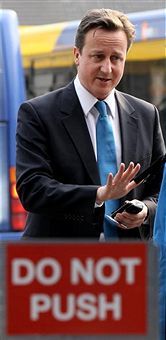 The Conservative Party’s departure from the European People’s Party came down to a
choice of expediency over principle. If you are inclined to accept that Britain will stay in the EU and that membership helps this country – even if it requires some compromises – you will likely
find the move unfortunate. If you are more concerned about the principles at stake – and feel that Britain’s loss of sovereignty has gone too far – and do not care about the loss
of influence on the legislative process, you are likely to be in favor of the Tory move.
The Conservative Party’s departure from the European People’s Party came down to a
choice of expediency over principle. If you are inclined to accept that Britain will stay in the EU and that membership helps this country – even if it requires some compromises – you will likely
find the move unfortunate. If you are more concerned about the principles at stake – and feel that Britain’s loss of sovereignty has gone too far – and do not care about the loss
of influence on the legislative process, you are likely to be in favor of the Tory move.
David Cameron is keen to keep the issue of Europe away from the campaign – and he is likely to succeed. Across the continent, but particularly in Britain, the EU plays only a limited role in political debates. Even during the German election there was very little mention of the EU. But Labour will seek to use the Tory alliance with a number of eastern European parties not only to bring EU into the campaign, but show that the Tory party is still “nasty”.
They are likely to fail. But as the EPP prepares to welcome the leader of the Hungarian Fidesz Party, Viktor Orbán – the party group’s 14th head of state – the EPP’s Secretary General, Antonio Lopez-Isturiz, has predicted the demise of the European Conservatives and Reformists Group (ECR) and invited the Tories rejoin the EPP. Saying he was hoping for a Tory victory in the election, Lopez-Isturiz predicted the Czech Civic Democratic Party (ODS) would re-join the EPP after former Prime Minister Mirek Topolanek was dismissed following his anti-semitic remarks. If ODS’ nine MEPs were to rejoin EPP, parliamentary rules would mean that the ECR would be one defection away from disbandment.
A return to the EPP is an almost impossible move for David Cameron to make. But the Tory leader needs to find a way to engage Europe’s other centre-right leaders besides one-on-one diplomacy. One way could be to tear a leaf out of the playbook written by Bill Clinton and Tony Blair, who set up the so-called progressive leaders summits, the first of which took place in 1999, which brought together heads of state and government and other high-ranking government and international officials with ties to socialist, social democratic, labour and democratic parties around the world. Prime Minister Cameron could join forces with President Sarkozy or Prime Minister Berlusconi and set-up a centre-right leader’s summit, neatly sidestepping the fact that the other leaders meet in the EPP by inviting centre-right leaders from around the world.






Comments